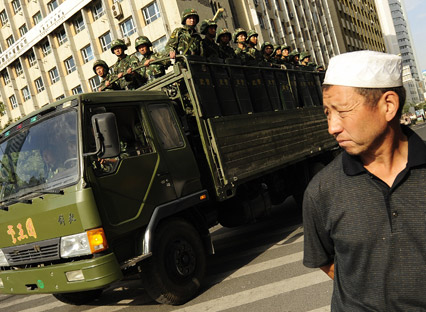Chinese authorities launch anti-halal campaign
Government officers in predominantly Muslim region of Xinjiang urged to speak Mandarin at work and in public

A free daily email with the biggest news stories of the day – and the best features from TheWeek.com
You are now subscribed
Your newsletter sign-up was successful
Authorities in China’s predominantly Muslim region of Xinjiang have launched a campaign against halal products in a bid to stop Islam “penetrating secular life” and fuelling “extremism”.
The move follows months of persecution of the 12 million Muslims, most of them Uighurs, who live in the northwestern region. Communist party officials in Urumqi, the capital of Xinjiang, are calling on government officers to strengthen the “ideological struggle” and fight “halalification”, or the “pan-halal tendency”, according to a notice posted on the city’s official account on messaging app WeChat.
This so-called tendency refers to the practice of “extending halal labelling – food that adheres to Islamic law – to non-food items to appeal to Muslim consumers”, says The Guardian. Officials and state media “say the growing number of products labelled halal allows Islamic rituals to penetrate secular life in China”, the newpaper adds.
The Week
Escape your echo chamber. Get the facts behind the news, plus analysis from multiple perspectives.

Sign up for The Week's Free Newsletters
From our morning news briefing to a weekly Good News Newsletter, get the best of The Week delivered directly to your inbox.
From our morning news briefing to a weekly Good News Newsletter, get the best of The Week delivered directly to your inbox.
Earlier this week, Liu Ming, secretary of the city’s Communist Party members group, led a meeting of party officials in an oath. A photo posted on the party’s WeChat account shows Liu speaking into a microphone, his fist clenched in the air, as he pledged: “My belief is Marxism-Leninism. I don’t believe in any religious belief. I must decisively fight against halalification to the end.”
The Chinese state-run Global Times newspaper says that the “demand that things be halal which cannot really be halal” is fuelling hostility toward religion. As part of the anti-halal campaign, Ilshat Osman, Urumqi’s ethnically Uighur head prosecutor, wrote an article for the newpaper, under the headline: “Friend, you do not need to find a halal restaurant specially for me.”
He argued: “We ethnic minorities have taken this respect for our eating habits for granted. We have not thought about respecting their eating habits.
“Changing eating habits has a significant and far-reaching impact for countering extremism!”
A free daily email with the biggest news stories of the day – and the best features from TheWeek.com
Chinese citizens “are theoretically free to practice any religion, but they have been subject to increasing levels of surveillance as the government tries to bring religious worship under stricter state control”, says Reuters.
The Chinese government has been subject to heavy criticism from international human rights groups and foreign governments amid reports of a punitive crackdown that has seen the detention of as many as a million, mostly Muslim, ethnic Uighurs in Xinjiang.
Beijing has denied reports of “political re-education camps” but “evidence is mounting in the form of government documents and testimonies from former detainees”, says France24.
-
 Why the Bangladesh election is one to watch
Why the Bangladesh election is one to watchThe Explainer Opposition party has claimed the void left by Sheikh Hasina’s Awami League but Islamist party could yet have a say
-
 The world’s most romantic hotels
The world’s most romantic hotelsThe Week Recommends Treetop hideaways, secluded villas and a woodland cabin – perfect settings for Valentine’s Day
-
 Democrats push for ICE accountability
Democrats push for ICE accountabilityFeature U.S. citizens shot and violently detained by immigration agents testify at Capitol Hill hearing
-
 Epstein files topple law CEO, roil UK government
Epstein files topple law CEO, roil UK governmentSpeed Read Peter Mandelson, Britain’s former ambassador to the US, is caught up in the scandal
-
 Iran and US prepare to meet after skirmishes
Iran and US prepare to meet after skirmishesSpeed Read The incident comes amid heightened tensions in the Middle East
-
 Israel retrieves final hostage’s body from Gaza
Israel retrieves final hostage’s body from GazaSpeed Read The 24-year-old police officer was killed during the initial Hamas attack
-
 China’s Xi targets top general in growing purge
China’s Xi targets top general in growing purgeSpeed Read Zhang Youxia is being investigated over ‘grave violations’ of the law
-
 Panama and Canada are negotiating over a crucial copper mine
Panama and Canada are negotiating over a crucial copper mineIn the Spotlight Panama is set to make a final decision on the mine this summer
-
 Why Greenland’s natural resources are nearly impossible to mine
Why Greenland’s natural resources are nearly impossible to mineThe Explainer The country’s natural landscape makes the task extremely difficult
-
 Iran cuts internet as protests escalate
Iran cuts internet as protests escalateSpeed Reada Government buildings across the country have been set on fire
-
 US nabs ‘shadow’ tanker claimed by Russia
US nabs ‘shadow’ tanker claimed by RussiaSpeed Read The ship was one of two vessels seized by the US military